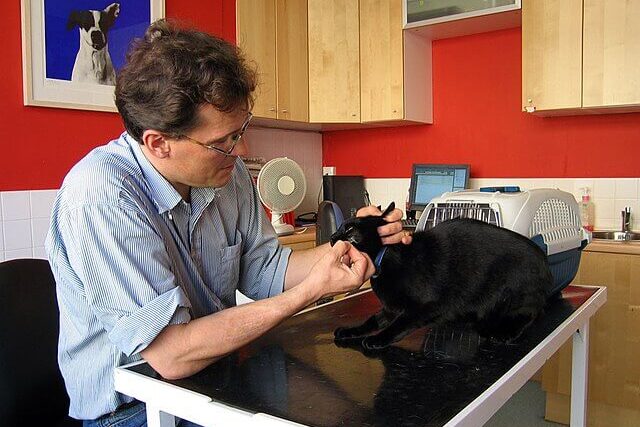
Scientists urge veterinarians to restrict the use of flea treatments containing pesticides in dogs and cats due to findings revealing significant levels of toxic substances entering rivers.
A study conducted by the University of Sussex and Imperial College London demonstrates that pet owners risk contaminating their hands with fipronil and imidacloprid, two insecticides, for at least 28 days after application.
Dave Goulson, a professor of biology at Sussex who supervised the research, said: “These two chemicals are extremely potent neurotoxic insecticides and it is deeply concerning that they are routinely found on the hands of dog owners through ongoing contact with their pet. Pet owners will also be upset to learn that they are accidentally polluting our rivers by using these products.”
Despite the absence of fleas, veterinarians frequently advise regular flea treatments to prevent infestations in pets’ fur. However, the study highlights the potential ecological repercussions, as these pesticides can harm can harm fish and invertebrates that live in waterways.
Goulson said: “I would argue that vets should stop encouraging dog and cat owners to use these treatments prophylactically. If an animal hasn’t got fleas, why would you treat it for fleas? The majority of use at present is simply not needed. Second, vets could encourage pet owners to wash the dog or cat bedding regularly – this is where the flea larvae live.”
The insecticides used in the flea products flow down household drains when pet owners wash their hands after applying the treatment. Wastewater from sewage treatment works is a leading source of fipronil and imidacloprid pollution in rivers, with concentrations exceeding safe limits for wildlife.
Although veterinary guidelines recommend avoiding contact with treated pets until the application site is dry, research published in the journal Science of the Total Environment reveals persistent contamination throughout the product’s lifespan.
Fipronil and imidacloprid, prevalent in monthly flea treatments, are no longer sanctioned for outdoor agricultural use. Imidacloprid, a neonicotinoid pesticide, poses particular concern due to its widespread application and potential impacts on environmental health.
Guy Woodward, a professor of ecology at Imperial College London and co-author of the research, said: “Despite these chemicals being banned from outdoor agricultural use for several years, we are still finding them in UK freshwaters at levels that could harm aquatic life. This paper shows how domestic pet flea and tick treatments, a largely overlooked but potentially significant source of contamination, could be polluting our waterways.”
Anna Judson, president of the British Veterinary Association, said: “Parasiticides play an important role in preventing and treating parasites in animals, which if left unaddressed can lead to bigger health and welfare issues in both animals and people … we encourage vets to consider the risks of an animal’s exposure to fleas or ticks when prescribing or recommending parasiticides, such as evaluating if a single house cat needs treatment at all.”
Goulson added that the insecticides could be harmful for human health. “More broadly, the environmental impacts of pet parasiticides need to be subject to proper risk assessments. At present they aren’t, based on a decision made long ago that pesticide use on pets was likely to be trivial in the grand scheme. If they’re on our hands then these neurotoxins will be all over our homes. That doesn’t sound healthy to me.
“A recent Swiss study found neonicotinoids in the cerebrospinal fluid of 100% of children tested. The health risks associated with long-term human exposure have not been studied.”
——————————————————————————
At Natural World Fund, we are passionate about stopping the decline in our wildlife.
The decline in our wildlife is shocking and frightening. Without much more support, many of the animals we know and love will continue in their decline towards extinction.
When you help to restore a patch of degraded land through rewilding to forests, meadows, or wetlands, you have a massive impact on the biodiversity at a local level. You give animals a home and food that they otherwise would not have had, and it has a positive snowball effect on the food chain.
We are convinced that this is much better for the UK than growing lots of fast-growing coniferous trees, solely to remove carbon, that don’t actually help our animals to thrive.
This is why we stand for restoring nature in the UK through responsible rewilding. For us, it is the right thing to do. Let’s do what’s right for nature!
Donate today at https://naturalworldfund.com/ and join in the solution!

